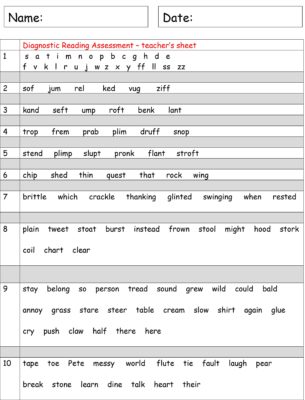When a pupil begins a reading programme it is important to assess where the pupil is at, what knowledge and skills he/she has acquired and what he/she needs to learn.
It is also useful to observe his/her reading strategies.
This will inform the teacher where to start and what to focus on.
This is particularly important for children who are struggling with reading. This assessment will help to determine from which point the teacher should start teaching.
The ‘Recommendations’ sheet will match suitable decodable books (from the Phonic Books range) to the reading level of the pupil.
How to use this Diagnostic Assessment
- Cut out the Reading cards. The pupil should read them in the sequential order. The teacher’s sheet is for the teacher to record the pupil’s responses.
- Ask the pupil to start with sounding out the letters at the beginning of the assessment. Note if the pronunciation of the sounds is ‘precise’ (no ‘uh’ after the consonants). Is the pupil using letter names instead of sounds?
- Explain to the pupil that the words in lists 2-5 are nonsense words which help to assess decoding skills. There is a symbol of an alien to demonstrate this.
- If the pupil starts to struggle, complete that section for diagnostic purposes. The teacher will need to use his/her judgement as to whether to start at this point or to start from the previous section in order to build up the confidence of the learner.
- Record what the pupil has said (not just a tick or cross). This will inform the teacher about the pupil’s reading strategies.
- Use the ‘Recommendations’ sheet to see where to start and which books to use with your pupil.


